
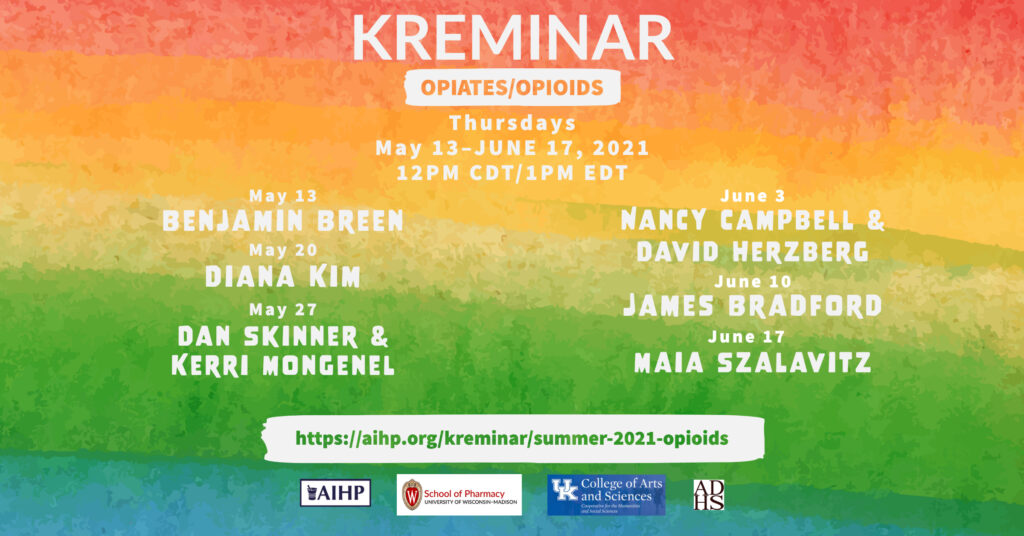
The the second annual Edward Kremers Seminar in the History of Pharmacy & Drugs took place in May and June of 2021. The Summer 2021 “Kreminar” explored the theme of Opiates & Opioids and featured six virtual seminars, presentations, and discussions by scholars and practitioners researching and writing about the history and the contemporary status of opiates, opioids, and addiction.
The Summer 2021 Kreminar consisted of streaming online Zoom presentations from 1:00–2:30 Eastern time (12:00–1:30 Central time) on six Thursdays. Participants were required to preregister for each presentation.
Hosts and sponsors of the Summer 2021 Kreminar were:
Download a .pdf poster for the Summer 2021 Kreminar or a .jpg poster for the Summer 2021 Kreminar.
To support content like this in the future, please consider joining the American Institute of the History of Pharmacy or the Alcohol and Drugs History Society.
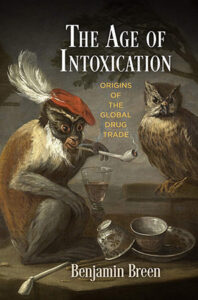
Host: Dr. Lucas Richert, George Urdang Chair in the History of Pharmacy at the University of Wisconsin–Madison School of Pharmacy & Historical Director at the American Institute of the History of Pharmacy
Moderator: Jonathan S. Jones, Postdoctoral Scholar, Richards Civil War Era Center, Penn State University
Abstract: This talk investigates the changing social and medical roles of the opium poppy (Papaver somniferum) over the past five centuries. Though the earliest documented appearance of the opium poppy in the historical record suggests that it was first domesticated in Neolithic Europe, by the sixteenth and seventeenth centuries, Europeans had begun to think of opium latex as an iconic drug of “the Indies.” Meanwhile, preparations of opium derived from seventeenth-century alchemical medicine, such as the opium tincture known as laudanum, were generating increasing interest and controversy among physicians and apothecaries in from London to Latin America to South Asia. By the early decades of the nineteenth century, medicines derived from Papaver somniferum had bifurcated into categories that mapped onto the imperialism of the era: on the one hand, the increasingly racialized and Orientalized opium latex; on the other, “purified” pharmaceuticals like morphine. Mapping these three ways of looking at opium—from flower, to latex, to pharmaceutical—can tell us much about the unspoken assumptions and colonial legacies that continue to shape contemporary debates about drugs.
Bio: Dr. Benjamin Breen is an associate professor of history at UC Santa Cruz interested in the history of globalization, science, drugs, and the long-term impacts of technological change. From July 2015 to January 2017 he was a postdoctoral fellow at the Society of Fellows in the Humanities at Columbia University, and a lecturer in Columbia’s history department. He is the author of The Age of Intoxication: Origins of the Global Drug Trade published by the University of Pennsylvania Press 2019, He grew up in California and earned his PhD in history from the University of Texas at Austin in 2015. In 2011, he received an AIHP PhD Research Grant.
Presentation Recording:
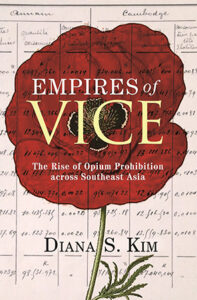
Hosts: Dr. Lucas Richert, UW–Madison School of Pharmacy & AIHP, and Dr. Claire Clark, Associate Professor of Behavioral Science at the University of Kentucky
Moderator: Jonathan S. Jones, Penn State University
Abstract: During the late nineteenth century, opium was integral to European colonial rule in Southeast Asia. The taxation of opium was a major source of revenue for British and French colonizers, who also derived moral authority from imposing a tax on a peculiar vice of their non-European subjects. Yet between the 1890s and the 1940s, colonial states began to ban opium, upsetting the very foundations of overseas rule—how did this happen? This talk explores the history of this dramatic reversal and colonial legacies that set the stage for the region’s drug problems today.
Diana Kim challenges the conventional wisdom about opium prohibition—that it came about because doctors awoke to the dangers of drug addiction or that it was a response to moral crusaders—uncovering a more complex story deep within the colonial bureaucracy. Drawing on a wealth of archival evidence across Southeast Asia and Europe, she shows how prohibition was made possible through the pivotal contributions of seemingly weak bureaucratic officials. Comparing British and French experiences across today’s Burma, Cambodia, Laos, Malaysia, Singapore, and Vietnam, Kim explains how the everyday work of local administrators delegitimized the taxing of opium, which in turn made major anti-opium reforms possible. This talk is based on her book, Empires of Vice: The Rise of Opium Prohibition across Southeast Asia (Princeton University Press, 2020), which reveals more generally the inner life of colonial bureaucracy, illuminating how European rulers reconfigured their opium-entangled foundations of governance and durably shaped Southeast Asia’s political economy of illicit drugs.
Bio: Dr. Diana S. Kim is assistant professor of political science at the Edmund A. Walsh School of Foreign Service at Georgetown University. Her research and teaching focuses on the transnational politics and history of markets across Southeast and East Asia, with particular interest in the regulation of vice, illicit economies, theories of crime and disorder, state formation, and legacies of Empire and colonialism. Diana has worked as a consultant for the Chicago Council on Global Affairs and her scholarship has been awarded prizes from the American Bar Foundation and the Social Science History Association.
Presentation Recording:
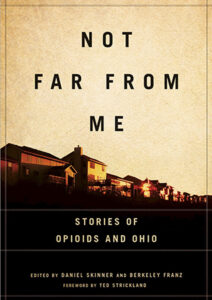
Host: Dr. Claire Clark, University of Kentucky
Moderator: Jonathan S. Jones, Penn State University
Abstract: In this session, Kerri Mongenel, a children services caseworker, and Daniel Skinner, a health policy researcher, offer their perspectives on the changing dynamics of addiction in Ohio. Far more than a merely technical problem that could be solved by a single policy solution, Ohio’s addiction crisis is a far-reaching sociological phenomenon, with consequences for virtually every social group and institution in Ohio, including families, schools, places of employment and faith, and beyond. In this conversation, Dan and Kerri talk about their own work on the opioid crisis. Kerri will reflect on her work with children and their families, but also her own processing of her daily work. Dan, co-editor of the recent book, Not Far From Me: Stories of Opioids and Ohio (Ohio State University Press, 2019), will share reflections on his work as a researcher and medical educator, including his work as a scholar of public humanities.
Bios: Dr. Daniel Skinner is Associate Professor of Health Policy in the Department of Social Medicine at Ohio University’s College of Osteopathic Medicine, on the Dublin campus. In addition to many peer reviewed articles in political theory, health policy, and medical education, Dan is the author of Medical Necessity: Health Care Access and the Politics of Decision Making (University of Minnesota Press, 2019) and co-editor of Not Far from Me: Stories of Opioids and Ohio (Ohio State University Press, 2019). He is also host of Prognosis Ohio, an NPR-affiliated podcast about health and health care in Ohio.
Kerri Mongenel is an Alternative Response Caseworker at Ashtabula County Children Services. Kerri has been a caseworker for 13 years, primarily working with children and families faced with substance abuse issues. She also assesses and investigates child abuse and neglect cases with a focus on maintain the family unit, while implementing necessary services for these families. Kerri maintains a blog about her experiences with substance abuse in her community and within the child welfare field. Her blog entries have been shared in several publications and featured in magazines, focusing on the opiate crisis in the state of Ohio.
Presentation Recording:
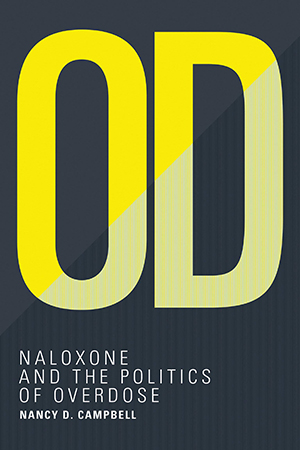
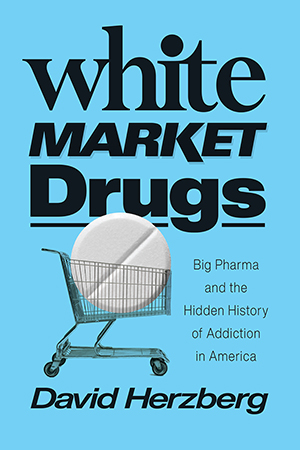
Hosts: Dr. Claire Clark, University of Kentucky and Dr. Lucas Richert, UW–Madison School of Pharmacy & AIHP
Moderator: Jonathan S. Jones, Penn State University
Until recently, historians who studied opioids studied criminalized heroin markets and their participants. Dr. Nancy Campbell, the author of OD: Naloxone and the Politics of Overdose (MIT Press, 2020), and Dr. David Herzberg, author of White Market Drugs: Big Pharma and the Hidden History of Addiction in America (University of Chicago Press, 2020), argue that we can’t understand prohibition markets unless we also understand the history of (much larger) pharmaceutical markets. Why did certain pharmaceutical opioids, and opioid antagonists, come to matter the way they did, when they did—particularly during the social and political ferment of the early 21st century’s “opioid crisis”? How does incorporating the story of pharmaceuticals change our understanding of the history of opioids, addiction, and overdose?
Bios: Dr. Nancy Campbell is the Department Head in the Department of Science and Technology Studies, Rensselaer Polytechnic Institute. She is a historian of science, technology, and medicine who focuses on legal and illegal drugs, drug science, policy, and treatment, harm reduction, and gender and addiction. She is the author of many books and articles, including Using Women: Gender, Drug Policy, and Social Justice (Routledge, 2000);
Dr. David Herzberg is Associate Professor of History and Coordinator of Addiction Studies at the University at Buffalo. A historian of drugs with a focus on the legal kind-—addictive medicines, he has published numerous scholarly and popular articles and is the author of Happy Pills in America: From Miltown to Prozac (Johns Hopkins University Press, 2010). He has published numerous articles. In 2001, he received an AIHP PhD Research Support Grant.
Presentation Recording:
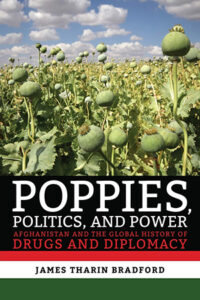
Hosts: Dr. Claire Clark, University of Kentucky, and Dr. Horace Bartilow, Professor of Political Science at the University of Kentucky
Moderator: Jonathan S. Jones, Penn State University
During this talk, Dr. James Bradford will show that drugs, especially opium, were critical components in the formation and failure of the Afghan state. He will unveil how the country moved from licit supply of the global opium trade to one of the major suppliers of illicit hashish and opium. Poppies, Politics, and Power: Afghanistan and the Global History of Drugs and Diplomacy (Cornell University Press, 2019) breaks the conventional modes of national histories that fail to fully encapsulate the global nature of the drug trade by explaining how Afghanistan’s emergence as a major supplier of illicit drugs is tied to broader changes to the global drug market and international drug control. Drawing from his book, Bradford’s talk will explore the global history of opium within the borders of Afghanistan, how the drug trade is tied to the formation of the Afghan state, and the future implications of drug production, trade, and use in Afghanistan and globally.
Bio: Dr. James Tharin Bradford is Assistant Professor of History at Berklee College of Music, and Adjunct Lecturer at Babson College. He has published in the Journal of Iranian Studies, Oxford University Handbook of Drug History, and Illegal Cannabis Cultivation in the World.
Presentation Recording:
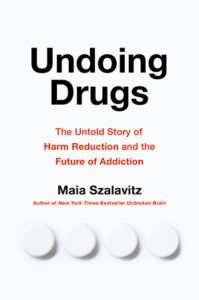
Host: Dr. Caroline Acker, Associate Professor of History Emerita at Carnegie Mellon University
Moderator: Jonathan S. Jones, Penn State University
This Q&A about Maia Szalavitz’s forthcoming book, Undoing Drugs: The Untold Story of Harm Reduction and the Future of Addiction (Hachette Books, 2021) will explore the history of harm reduction and what it suggests about dealing with the current overdose crisis. It will examine the false narrative that now drives opioid policy and how harm reduction offers both a more accurate and a more effective way to manage drug problems.
Bio: Maia Szalavitz has written for numerous publications from High Times to the New York Times, including TIME, the Washington Post, the Guardian, VICE, Scientific American, and the Atlantic— and she is author or co-author of six other books. She has won awards from the National Institute on Drug Abuse, the Drug Policy Alliance, the American Psychological Association and the American College of Neuropsychopharmacology for her 30 years of groundbreaking writing on addiction, drug policy, and neuroscience.
Presentation Recording:

Who was Edward Kremers?
Edward Kremers (1864-1941) was the second Director of the University of Wisconsin Department of Pharmacy (later the UW–Madison School of Pharmacy) and a co-founder of the American Institute of the History of Pharmacy. Throughout his career, he strongly believed in the importance of history and the value of humanistic research in pharmacy and the health sciences. Kremers also encouraged critical thought about drug consumption and control in the United States, encouraging the news media, political leaders, and pharmacy leaders to think about the meanings associated with words like “drug,” “narcotics,” and “medicine.” He opposed prohibitionist impulses and groups, arguing that that restrictive measures would not solve the misuse of certain substances. Kremers also resisted language and policies that placed blame on foreigners for drug addiction or crime.
